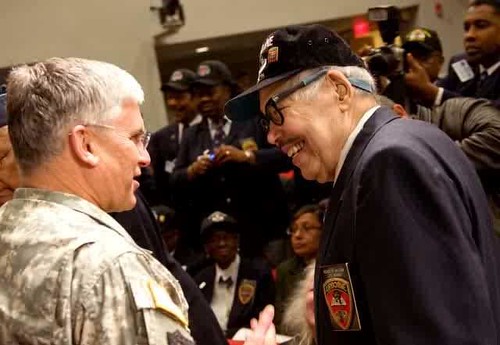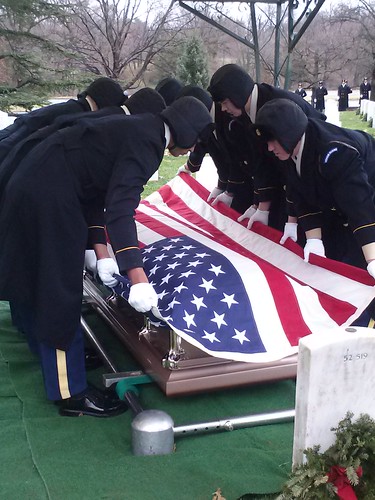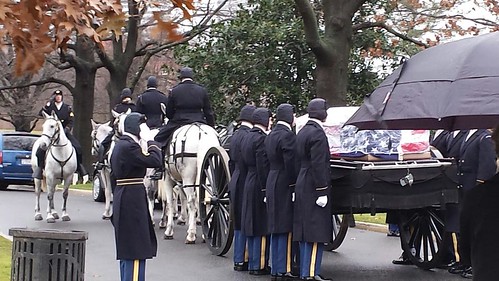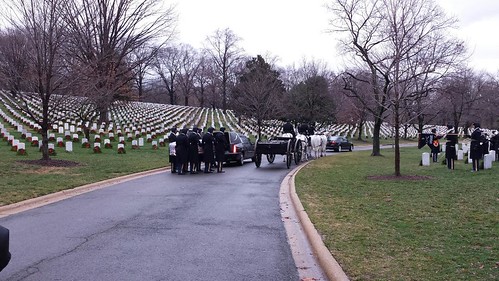
Gen. George W. Casey Jr., former chief of staff of the Army, talks to Lt. Col. Roger Walden during a recognition ceremony at the Pentagon on March 25, 2010. (U.S. Army)
During World War II, a time when segregation was still a part of everyday life, a group of 17 brave men took the plunge to serve their country and become the first all African-American paratrooper unit known as the Triple Nickles.
The battalion’s original goal – to join the fight in Europe – was thwarted when military leaders in Europe feared racial tensions would disrupt operations. At about the same time, the U.S. Forest Service asked the military for help to minimize damage caused by balloon bombs launched by the Japanese across the Pacific Ocean with the intent to start forest fires in the western U.S. during World War II.
In the end, few of the incendiary devices reached U.S. soil, but the Triple Nickles were instrumental in helping the Forest Service fight naturally-caused fires. They became history’s first military smokejumpers who answered 36 fire calls and made more than 1,200 jumps that summer of 1945.
On Jan. 6, Lt. Col. Roger S. Walden, who passed away on Sept. 17, 2013, was remembered and given full military honors at Arlington National Cemetery.
Walden holds a special place in U.S. Forest Service history. He will be remembered for his bravery, sacrifice and groundbreaking achievements in wildland firefighting. During a time of war and social prejudices, the commitment to serve his country through wildland firefighting was challenging and unique.
“Lt. Col. Roger Walden was one of the original 17 test platoon members of the 555th Parachute Infantry Battalion – hence the nickname Triple Nickles – who contributed to fighting wildfires in the Pacific Northwest during World War II led by Gen. James Gavin,” said Joe Murchison, president of the 555th Parachute Infantry Association Inc. “He will be sorely missed by all who knew and loved him.”

An American flag is draped over Lt. Col. Roger Walden’s casket at Arlington National Ceremony. (Stefani Walden)
Born in Des Moines, Iowa, Walden attended schools in Des Moines and Chicago. While working at Ford Motor Company at the onset of World War II, he enlisted in the U.S. Army on Dec. 7, 1942, one year after Pearl Harbor. In 1943, at Fort Huachuca, Ariz., he volunteered for paratrooper training at Fort Benning, Ga., and received his wings in 1944.
Walden was promoted to sergeant in the 555th and later completed Officer Candidate School at Fort Benning, receiving his commission as a second lieutenant in March 1945. The 555th was deployed on secret orders to become history’s first military smokejumpers, combating aerial attacks by Japanese balloon bombs across the Pacific Northwest during Operation Firefly.
In honor of the paratroopers, the Forest Service recently named a conference room after the Triple Nickles in its newly renovated Yates Building, the agency’s national headquarters office in Washington, D.C.

The body of Lt. Col. Roger Walden is unloaded from a caisson at Arlington National Cemetery. (Donna Sinclair)
After being transferred to Fort Bragg, the 555th became attached to the elite 82nd Airborne Division. In 1949, Walden served as commander of Company A in Gifu, Japan. He commanded Company F in Pusan, Korea, and was awarded the Silver Star for heroism during the Korean War. Walden served as a major in Giessen, West Germany, from 1957 to 1960, earned his bachelor’s degree in social studies at San Francisco State University, and was promoted to lieutenant colonel. He taught military science at Central State University in Ohio until his retirement in 1966 and then worked as manager of the City of Detroit’s Housing Rehabilitation Program until 1984.
“I’m very proud of my dad’s military service,” said Rogena Ann Walden. “He certainly earned the privilege of being laid to rest at Arlington National Cemetery with full honors. I’m also grateful for the example he set — he was a wonderful father.”
February is African-American History Month.

A processional for Lt. Col. Roger Walden enters Arlington National Cemetery. (Donna Sinclair)






